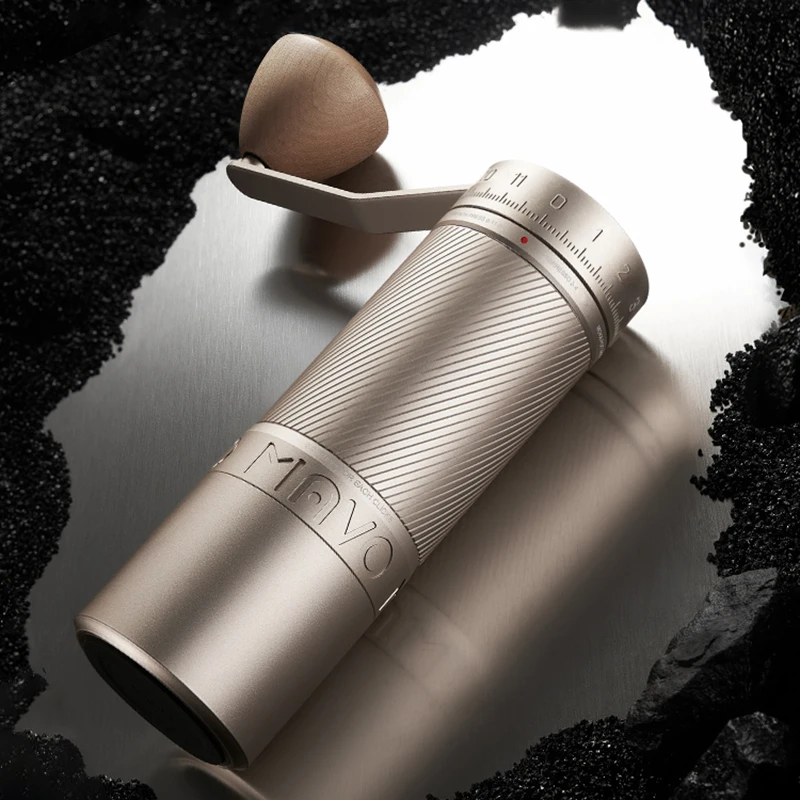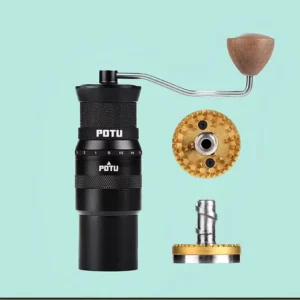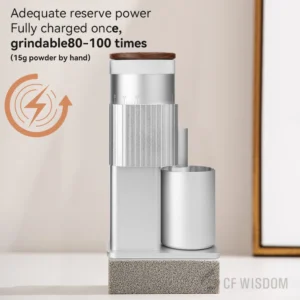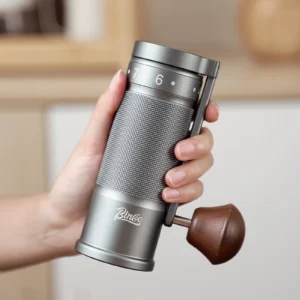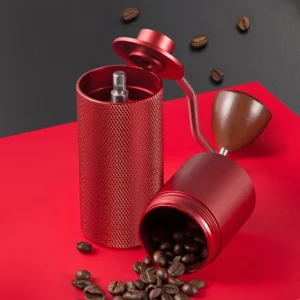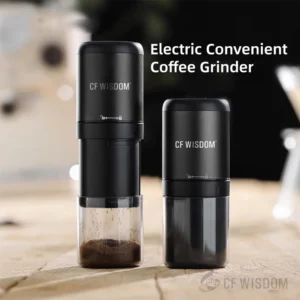The Enduring Appeal of Metal: Core Advantages of All-Metal Coffee Grinders
When we talk about an “all-metal” coffee grinder, we’re referring to a device where the critical components—housing, burrs, internal mechanisms, and adjustment systems—are constructed primarily from metal materials rather than plastic. This distinction might seem subtle, but the impact on your daily coffee experience can be profound.
The appeal of all-metal coffee grinders stems from five fundamental advantages:
- Exceptional durability – Metal grinders typically last 5-10+ years compared to plastic models that may need replacement after just 1-3 years
- Superior grind consistency – Metal’s rigidity maintains precise burr alignment for uniform coffee particles
- Effective heat management – Metal dissipates grinding heat quickly, protecting delicate coffee flavors
- Taste purity – Unlike plastic, metal doesn’t absorb coffee oils or impart unwanted flavors
- Premium build quality – The satisfying weight and solid feel reflect craftsmanship and attention to detail
The material choice in your coffee grinder isn’t merely about aesthetics or perceived quality—it fundamentally determines how well the grinder performs its core function. All-metal coffee grinder design principles emphasize stability, precision, and longevity over cheaper manufacturing costs.
For coffee enthusiasts searching for exceptional grinding performance without compromise, all-metal hand grinders represent an investment in better coffee that pays dividends with every cup you brew.
Unmatched Durability and Longevity: An Investment That Lasts
The superior durability of all-metal coffee grinders becomes apparent within months of regular use. While plastic components can develop stress fractures, warp under pressure, or crack at connection points, metal parts maintain their structural integrity even through years of daily grinding.
The most vulnerable areas in coffee grinders—burr mounts, adjustment mechanisms, and handles—benefit tremendously from metal construction. The thread systems that control grind size remain precise without developing the play or looseness common in plastic alternatives. Even after thousands of adjustments, a well-made metal grinder maintains the same accuracy it had on day one.
This exceptional durability translates directly into long-term value. Though the initial investment might be 2-3 times higher than a plastic-composite grinder, the extended lifespan makes stainless steel coffee grinder durability a compelling economic proposition. Many coffee professionals still use the same metal grinder after a decade of service—a testament to how these tools become lifetime companions rather than disposable appliances.
The lasting precision also ensures consistent results throughout the lifespan of quality manual coffee grinders, avoiding the gradual decline in performance that plastic grinders often exhibit as their components wear down.
Elevated Grind Consistency: The Foundation of Great Coffee
Grind consistency might be the single most important factor in brewing exceptional coffee, and here is where all-metal construction truly proves its worth. Metal housing provides crucial stability that minimizes vibrations during the grinding process, allowing the burrs to maintain precise alignment even under pressure.
This structural rigidity prevents the subtle flexing that occurs in plastic grinders, particularly when grinding dense, light-roasted beans. When housing flexes even slightly, it creates inconsistent pressure on the beans, resulting in a mixture of particle sizes. With metal construction, the precisely engineered spacing between burrs remains constant throughout the grinding process.
The practical impact on your coffee is significant—uniform particle size enables even extraction, where water interacts similarly with each ground particle. When grounds are inconsistent, smaller particles over-extract (creating bitterness) while larger particles under-extract (creating sourness), resulting in an unbalanced cup.
This consistency becomes especially critical for brewing methods like espresso, where minor variations in grind size dramatically affect flow rate and extraction. Understanding factors affecting grind consistency helps appreciate why coffee professionals overwhelmingly choose metal construction for their precision manual grinders.
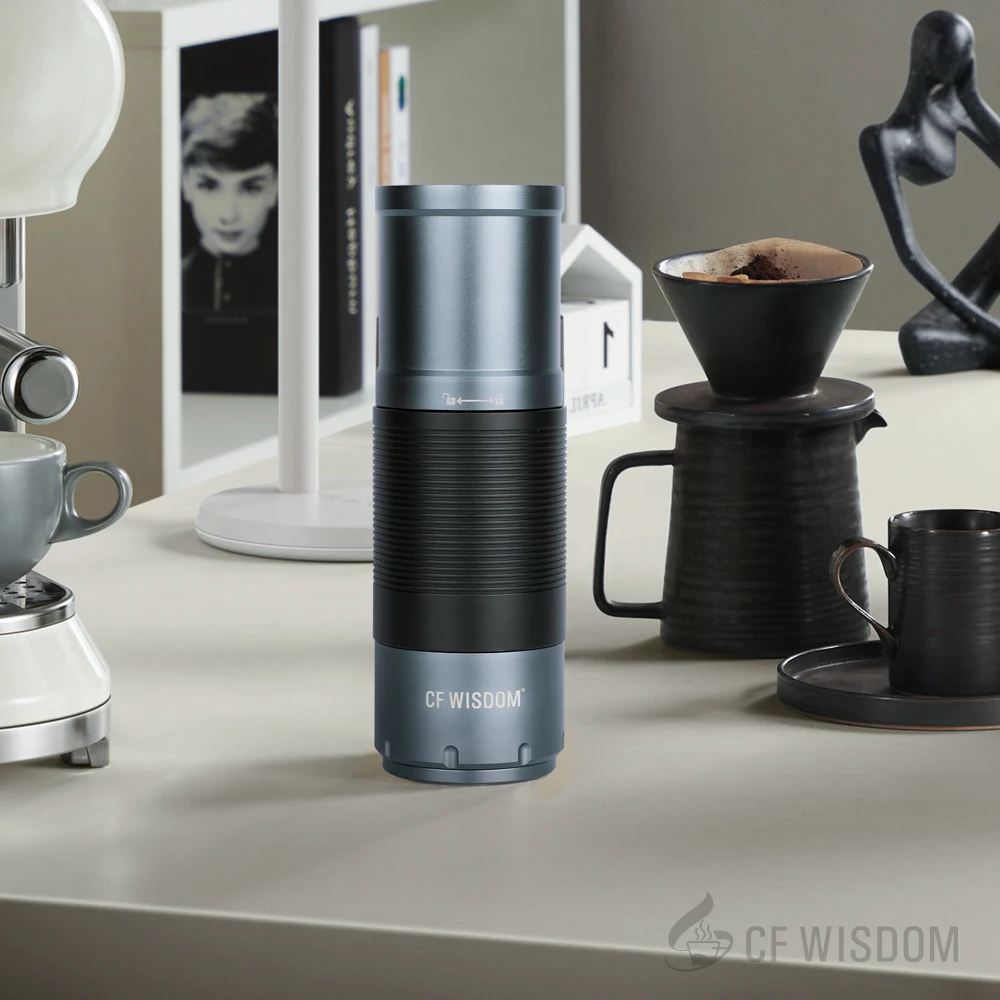
Optimal Heat Management: Protecting Delicate Coffee Flavors
When coffee beans are ground, friction between the burrs and beans generates heat—an often overlooked factor that can significantly impact flavor. All-metal grinders excel in heat management through their superior thermal conductivity, quickly dissipating heat rather than allowing it to build up in the grinding chamber.
This heat management capability becomes especially important during longer grinding sessions. Materials like aluminum and stainless steel efficiently transfer heat away from the beans and burrs, preventing the microscopic “cooking” of aromatic oils and compounds that can occur when grounds are exposed to elevated temperatures.
In contrast, plastic acts as an insulator, trapping heat where it can adversely affect coffee flavor compounds. Even small temperature increases can cause volatile aromatics to evaporate prematurely and alter the chemical composition of coffee oils, diminishing the complexity of your final brew.
The impact of heat retention in metal coffee grinders is particularly beneficial for preserving delicate flavor notes in specialty coffees. Understanding how coffee grinders can overheat explains why commercial coffee shops almost exclusively use metal grinders—they recognize that proper heat management is essential for showcasing the full flavor potential of quality beans.
Beyond Materials: Metal Housing Construction and Performance
The housing material fundamentally influences every aspect of a coffee grinder’s performance, from stability during operation to long-term durability:
| Feature | Stainless Steel | Aluminum | Plastic |
|---|---|---|---|
| Weight | Heavy (excellent stability) | Medium (good stability) | Light (poor stability) |
| Durability | Exceptional (decades) | Very good (5-10+ years) | Limited (1-5 years) |
| Heat Dissipation | Good | Excellent | Poor |
| Vibration Control | Excellent | Good | Limited |
| Cleaning Ease | Very easy | Easy | Variable |
| Odor/Taste Retention | None | None | Possible |
The added weight of metal housing might initially seem like a disadvantage, but experienced users recognize it as a significant benefit. This weight creates stability during grinding, preventing the “walking” movement common with lightweight plastic grinders. The solid base stays firmly planted, allowing you to focus on maintaining consistent grinding motion rather than stabilizing the device.
Metal housing also minimizes vibration, which directly translates to more consistent particle size. Each rotation of the burrs remains smooth and controlled, without the subtle movements that can create irregularities in grind size. Understanding coffee grinder material differences helps explain why serious coffee enthusiasts gravitate toward stainless steel manual coffee grinders for their daily brewing routine.
The Heart of Performance: All-Metal Grinding Burrs
While all components matter, the burrs represent the most critical element in any coffee grinder. These precision-engineered cutting surfaces determine how uniformly beans are ground and directly impact extraction quality. Various metal burr materials offer different performance characteristics:
Hardened steel burrs deliver exceptional sharpness and precision, maintaining their cutting edge through years of use. Their hardness rating (typically 55-60 HRC) ensures they remain sharp even when grinding thousands of pounds of coffee.
Stainless steel burrs provide excellent corrosion resistance while maintaining very good cutting performance. They’re particularly valuable in humid environments where rust prevention becomes important.
Specialized coatings like titanium nitride offer additional hardness and friction reduction, further enhancing longevity and performance in premium models.
The geometry of metal burrs—angles, cutting surfaces, and alignment—works in harmony with the material properties to create consistent particle sizes. The rigid nature of metal allows for precision manufacturing with tolerances measured in micrometers, something plastic simply cannot match.
While ceramic burrs have their advocates, metal burrs generally provide superior sharpness retention and break resistance. Understanding how burr size affects coffee grind quality reveals why many coffee professionals prefer the performance characteristics of metal burrs, particularly in flat burr hand grinders designed for maximum consistency.
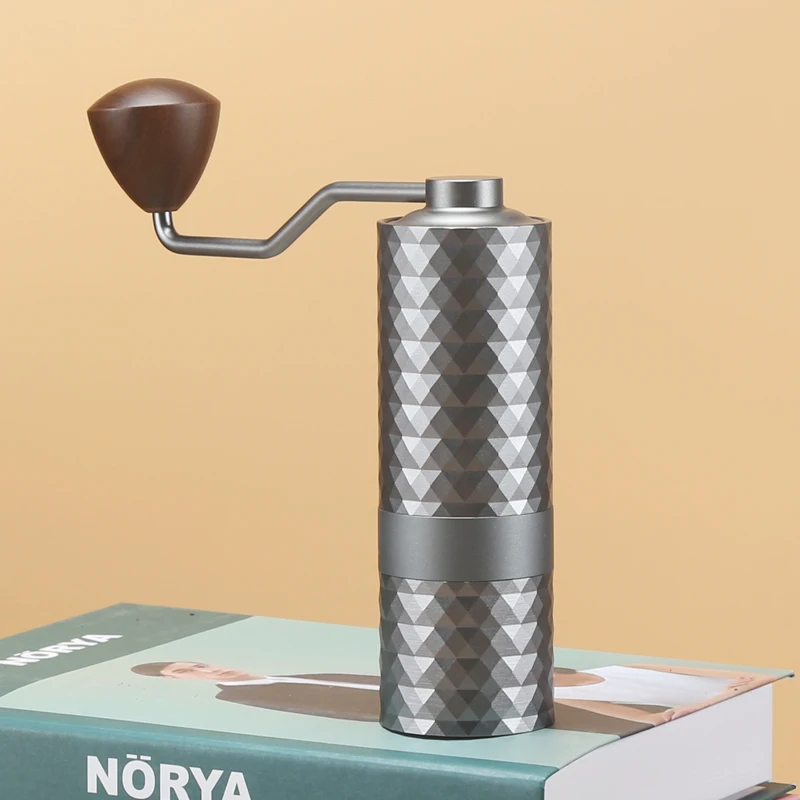
Addressing Common Questions About All-Metal Grinders
Are all-metal grinders worth the higher price?
The value proposition becomes clear when considering longevity and performance stability. While all-metal grinders typically cost 2-4 times more than plastic alternatives, their usable lifespan often exceeds 10 years compared to 1-3 years for plastic models. This makes the lifetime cost-per-use significantly lower for metal grinders, alongside the benefit of consistent performance throughout that lifespan.
Does the extra weight of metal grinders create problems?
Rather than being a disadvantage, the additional weight provides stability during grinding, preventing the grinder from moving during use. The weight considerations in metal grinders actually contribute to more consistent results and easier operation.
Are metal grinders significantly louder than plastic ones?
Contrary to what some might expect, high-quality metal grinders often operate more quietly than plastic alternatives. The solid construction absorbs vibrations rather than amplifying them, resulting in a deeper, less resonant grinding sound.
Do metal burrs generate too much heat?
While metal burrs can conduct heat, the thermal mass and conductivity of an all-metal grinder actually help dissipate heat more effectively than plastic models, protecting flavor compounds in your coffee beans.
Maintaining Your All-Metal Grinder for Peak Performance
Proper maintenance ensures your all-metal grinder continues performing optimally for years to come:
- Daily maintenance: After each use, brush loose grounds from burrs and collection chamber using a soft brush
- Weekly cleaning: Disassemble the burr chamber and thoroughly remove coffee particles from burrs and threads using a small brush
- Monthly deep clean: Completely disassemble the grinder according to manufacturer instructions and clean all components
- Periodic burr inspection: Check burrs every 3-6 months for signs of wear, though quality metal burrs typically maintain performance for years
For most all-metal grinders, avoid using water on the burr mechanism, as some internal components may still be susceptible to corrosion. Instead, use grinder cleaning tablets or uncooked rice to absorb oils and remove residue from burrs.
Different metal types may require specific care—aluminum components should avoid harsh detergents, while stainless steel parts offer more cleaning flexibility. Following a comprehensive manual burr coffee grinder cleaning routine will significantly extend the lifespan and maintain the performance of your investment.
Is an All-Metal Coffee Grinder Right for You? Decision Factors
All-metal grinders deliver the most value for specific users and brewing styles:
The ideal user for an all-metal grinder:
* Values consistency and precision in their coffee brewing
* Prepares coffee daily or multiple times daily
* Appreciates tools that improve with time and develop character
* Understands that grinding quality directly impacts extraction quality
An all-metal grinder becomes particularly valuable when brewing methods demand precise particle size—espresso, pour-over, and siphon brewing all benefit significantly from the consistency that metal grinders provide. The difference is less pronounced for immersion methods like French press, though even these benefit from improved flavor clarity.
Understanding the differences between metal and plastic hand grinder construction can help determine whether the premium price of an all-metal grinder aligns with your specific coffee priorities. For those seeking maximum performance and longevity, all-metal manual coffee grinders represent the gold standard in home grinding.
Fine Adjustment Hand Grinder, Precision Manual Grinder, Travel Coffee Grinder
Price range: $185.11 through $494.63 Select options This product has multiple variants. The options may be chosen on the product pageManual Burr Mill, Manual Coffee Grinder Stainless Steel, Manual Coffee Mill Grinder, Mechanical Coffee Grinder
Price range: $127.26 through $130.32 Select options This product has multiple variants. The options may be chosen on the product pageHand Burr Grinder, Manual Coffee Grinder Stainless Steel, Precision Manual Grinder
Price range: $183.64 through $187.52 Select options This product has multiple variants. The options may be chosen on the product pageManual Coffee Grinder Stainless Steel, Manual Espresso Grinder, Travel Coffee Grinder
Price range: $276.22 through $276.39 Select options This product has multiple variants. The options may be chosen on the product page
What to Look For When Buying an All-Metal Coffee Grinder
When selecting an all-metal coffee grinder, prioritize these key specifications to ensure you’re getting a truly premium tool:
- Burr material and quality – Look for hardened steel or stainless steel burrs with precise manufacturing
- Bearing quality – Double bearings provide superior stability and smoother operation
- Thread precision – Fine thread patterns allow for more precise grind size adjustments
- Housing material – Full metal construction (not just metal-plated) ensures maximum durability
- Burr alignment – Pre-calibrated burr alignment ensures consistent particle size
- Ergonomics – Handle design and grip comfort matter for daily use
The adjustment mechanism deserves particular attention—look for clearly defined settings with tactile feedback rather than stepless systems that can drift during use. Quality models often feature numbered settings or click adjustments that maintain their position reliably.
For maintenance accessibility, ensure the grinder can be disassembled without special tools and that replacement parts are available should they ever be needed. This serviceability dramatically extends the useful life of premium coffee equipment.
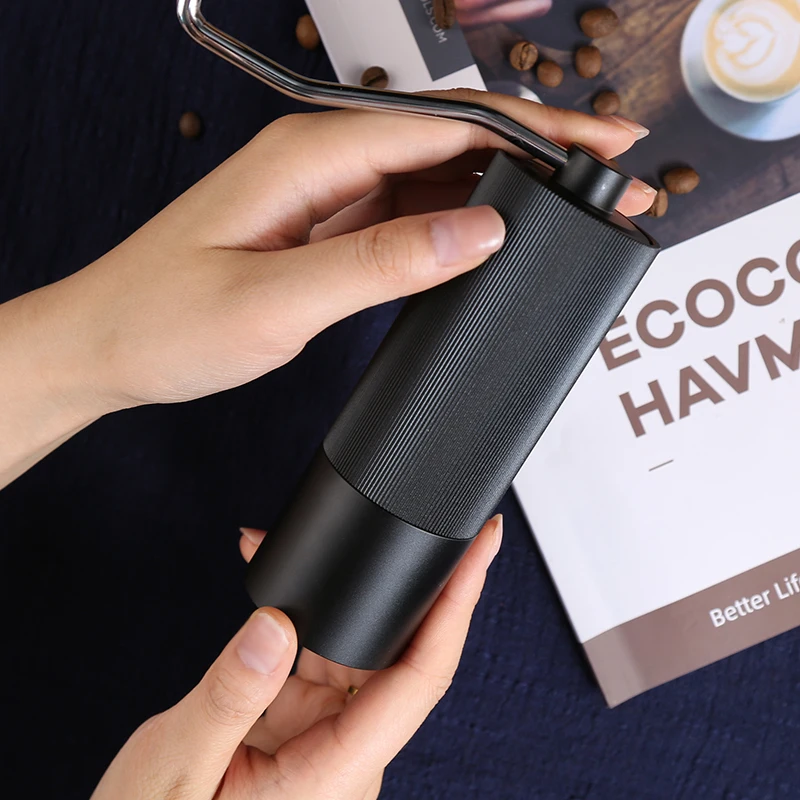
The Savor Suite collection of stainless steel manual coffee grinders features models selected specifically for their exceptional construction quality and grinding performance.
Frequently Asked Questions About All-Metal Coffee Grinders
Do metal grinders require special maintenance?
Metal grinders generally require less maintenance than plastic alternatives. Regular cleaning with a brush and occasional disassembly for deep cleaning is sufficient. Unlike plastic grinders, metal components resist odor absorption and typically don’t require special cleaning products.
How much better are steel burrs compared to ceramic?
Steel burrs typically offer better precision, consistency, and durability. While ceramic burrs stay sharp for a very long time, they’re more brittle and susceptible to damage from foreign objects (like small stones that occasionally appear in coffee beans). Steel burrs provide more consistent grinding performance across various coffee types and roast levels.
Will an all-metal grinder rust?
Quality all-metal grinders use materials chosen specifically to resist corrosion. Stainless steel components resist rust indefinitely with basic care, while aluminum components naturally form a protective oxide layer. Understanding full-metal manual coffee grinder housing features helps clarify which metals are used in different parts of the grinder.
Are all-metal grinders significantly harder to turn?
Well-designed metal grinders use precision bearings that make grinding surprisingly easy despite the solid construction. The grinding resistance comes primarily from the beans, not the mechanism itself. Quality engineering actually makes many premium metal grinders easier to operate than less expensive alternatives.
Are All-Metal Grinders Worth the Higher Price?
When evaluating the value proposition of an all-metal coffee grinder, consider both the immediate and long-term benefits. While the initial investment might be 2-3 times higher than entry-level grinders, the amortized cost over a decade of daily use makes premium grinders remarkably economical.
More importantly, the quality of your daily coffee experience improves substantially with better grinding. Even expensive specialty beans can’t reach their full potential when ground inconsistently. A premium metal grinder maximizes the value of every coffee purchase by unlocking the full flavor potential those beans contain.
For coffee enthusiasts who appreciate the ritual of manual brewing, an all-metal grinder becomes a treasured tool that enhances both the process and the result. Our manual coffee grinders designed for espresso demonstrate how precision engineering transforms the coffee experience from ordinary to exceptional, one perfectly ground bean at a time.

